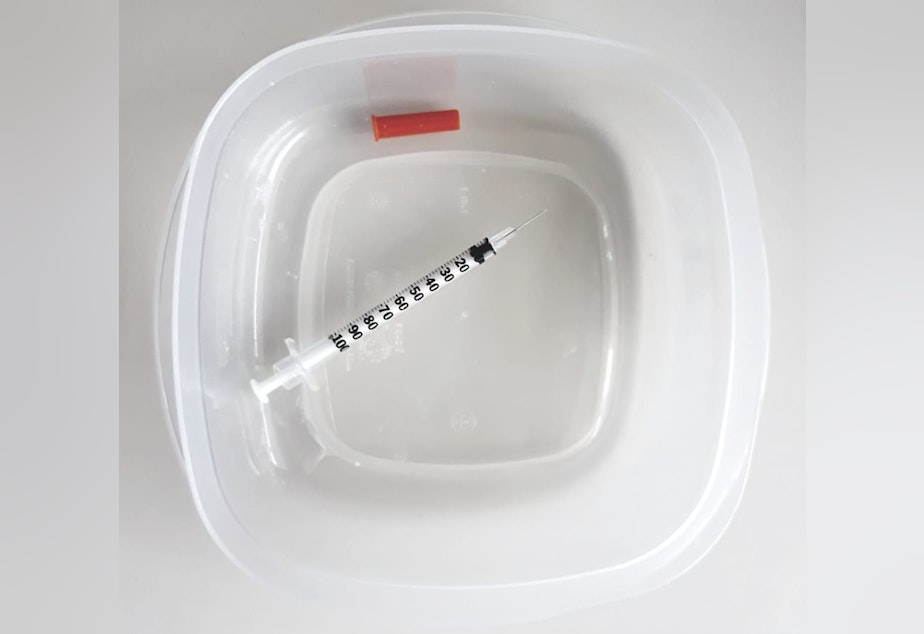Tupperware writes us a surprising email about a needle disposal story

Last week, KUOW reporter Anna Boiko-Weyrauch reported on what to do with discarded needles.
This is an issue for Seattle, where complaints about loose needles are on the rise, and for King County as a whole, where opioid overdose deaths have also risen.
Anna wrote that Seattleites can message the city or take matters into their own (gloved) hands: “A thick plastic container with a tight-fitting lid, such as a sharps container sold at a pharmacy (smaller ones cost around $6), soda bottle, or Tupperware (something under two liters will fit in a disposal container).”
The Tupperware Brands Corporation apparently took umbrage with this phrasing. KUOW received an email from Robert A. Becker, counsel at Fross Zelnick Lehrman & Zissu, P.C. in New York City, asking us to remove the reference to Tupperware.
“You are not referring specifically to containers made by our clients,” Becker wrote.
“Rather, you are referring to containers in general, since there is no reason why our clients’ containers would be any more appropriate for this purpose than another brand of containers.”
Sponsored
He continued: “We assume this usage of our clients’ mark is simply the result of an innocent error. We therefore ask that you remove this reference to ‘Tupperware’ from the article. Although the editing is of course up to you, you could change the word ‘Tupperware’ to ‘plastic container.’”
We used the word Tupperware, rather than “plastic container,” because it drives home the point: We’re not talking about an old hummus container with a flimsy lid, but a thick-plastic food storage system that holds in our soup … and won’t let the needle slip out.
And also, it turns out Seattleites do say they use Tupperware to pick up needles.
From the app “Find it, Fix it” submitted near Northgate: “Found a needle in front of my house (by the abandoned truck previously reported). Not sure how to dispose of it but didn't want to leave it for my kid to find. Have it in a Tupperware in my garbage bin behind my house.”
Tupperware isn’t the only brand word that is used generically (these are called “generic trademarks”). We refer to large garbage bins as Dumpsters, and see-through popping stuff as Bubble Wrap. We say Kleenex instead of “soft nose tissues,” and Zamboni instead of “ice resurfacer.”
Sponsored
And Popsicle and Chapstick and Tarmac and Ping-Pong!
According to Media Miser, companies that don’t want their brand to be genericized must “patrol, patrol, patrol, and control the use of the mark in the marketplace to make sure people are using it as a trademark.”
Which is what Tupperware is doing with their letter.
Here’s that letter in full:
Dear Ms. Boiko-Weyrauch: We represent Tupperware Brands Corporation and Dart Industries Inc. ("Dart"), its subsidiary, in trademark and unfair competition matters.
Our clients and their predecessors-in-interest have continuously used the famous and unique trademark TUPPERWARE in connection with the selling of plastic containers, as well as related goods and services, for more than 60 years, and Dart owns many incontestable trademark registrations for the TUPPERWARE mark, including U.S. Reg. No. 2,820,832.
Since TUPPERWARE is a registered trademark of our clients, the word “Tupperware” should only be used to refer to products made by our clients.
We are writing to you because our clients noticed that in your article, the following sentence appears: “A thick plastic container with a tight-fitting lid, such as a sharps container sold at a pharmacy (smaller ones cost around $6), soda bottle, or Tupperware (something under two liters will fit in a disposal container).”
However, in this article you are not referring specifically to containers made by our clients.
Rather, you are referring to containers in general, since there is no reason why our clients’ containers would be any more appropriate for this purpose than another brand of containers.
We assume this usage of our clients’ mark is simply the result of an innocent error.
We therefore ask that you remove this reference to "Tupperware" from the article. Although the editing is of course up to you, you could change the word “Tupperware” to “plastic container.”
Please let us know when this change has been made. Thank you very much for your cooperation.
Rob Becker
Robert A. Becker | Counsel





